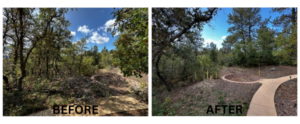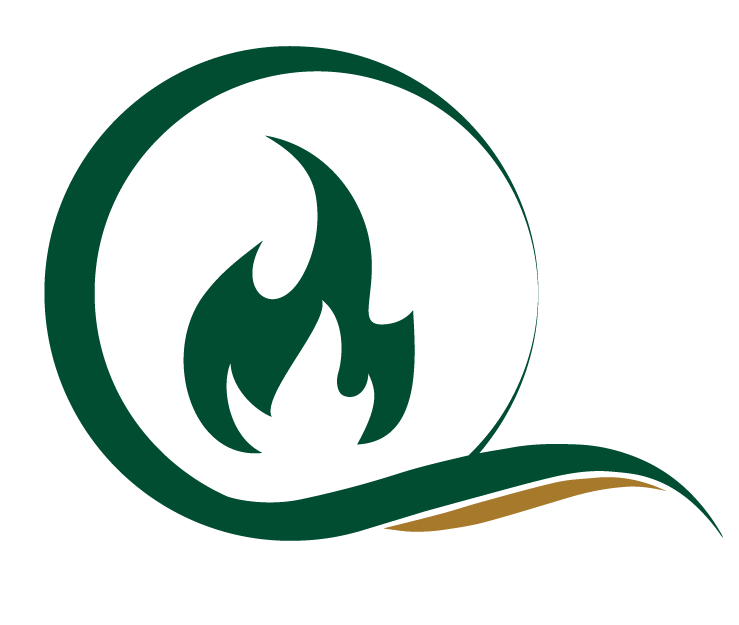In service of the City Council's strategic goals and priorities, the City has developed a grant program to support the community by providing financial resources to eligible community members to conduct wildfire mitigation projects and reduce the risk of wildfire in the community.
History of Wildfire Mitigation in Castle Pines
The City of Castle Pines began strategic mitigation efforts in 2022, which included collaborating with the Castle Pines North Metro District and various Homeowner Associations to reduce hazardous wildfire fuels in high-priority areas utilizing goat mitigation. These efforts successfully treated 25 acres of gamble oak over a five-month period. The City also hosted two Slash events at Elk Ridge Park in 2022, where residents have the opportunity to drop off yard debris for free.
In 2023, the City continued these efforts by completing two more large wildfire mitigation projects covering approximately 33 acres and announcing the first Community Wildfire Mitigation Grant funding cycle.
As wildfire mitigation efforts continue, the City encourages the community to participate in efforts to keep the community safe and reduce the risk of wildfire.
Importance of Fire Mitigation
The Douglas County Hazard Mitigation Plan has identified wildfire as the top risk in Castle Pines, and the Colorado State Forest Service has identified Castle Pines within Colorado’s Wildland-Urban Interface. These identifications indicate the need for wildfire mitigation in order to reduce the risk of uncontrolled wildland fire hazards and protect the community. City Council has identified wildfire mitigation as a Council priority to protect the Castle Pines community.
The Future of Wildfire Mitigation in Castle Pines
With the recent transfer of Castle Pine North Metro District properties to the City, a Community Wildfire Prevention Implementation Plan was developed to prioritize the mitigation work that is necessary. This plan will guide City wildfire mitigation operations over the next few years.
Grant Details
Homeowner associations (HOAs) and individual residents can apply for wildfire mitigation funding. The City will accept funding requests for up to $5,000 from an HOA and up to $250 from a resident. All funding requests require a minimum match of 50% from all applicants. However, providing a higher match percentage will score higher.
This means that if a resident has a wildfire mitigation project expected to cost $500 or more, they would be eligible to ask for the full $250 of City funds.
Additional Information
-
-
- HOA projects should focus on open space and vegetation mitigation, while individual resident projects should focus on home hardening
- Projects must be completed after award notice is received. Projects completed prior to award are not eligible for reimbursement
- Any planted plants must be of a species on the approved Wildfire Resistant Plant List
- Participating in Slash Mulch programs to dispose of any wood materials, tree limbs, shrubs, or brush is strongly encouraged
- If your project is selected, funds will be reimbursed after completion of the project. In order to receive reimbursement, a final report, before and after pictures, and proof of payment or receipt(s) must be submitted
-
2025 Funding Cycle Timeline
Applications release: January 6, 2025
Applications close: March 29, 2025
Notice of Awards: April 1, 2025.
Project completion and final report submitted: No later than December 31, 2025, at 11:59 pm.
FAQs
Who can apply for a community wildfire mitigation grant?
Homeowner associations and individual Castle Pines residents can apply for this grant. However, the applicant must be a Castle Pines community member, and the project must occur within the City of Castle Pines boundaries.
If I don't apply this cycle, will I have an opportunity to apply again?
In alignment with the City Council's strategic goals, it is anticipated that funding will be allocated annually to continue to fund community wildfire grants. It is anticipated community members will have an opportunity to apply next year.
Can I apply for funding for a project that I have already completed?
No. When applying for this grant program, work must not be conducted until a notice of award is received. Additionally, all related work must be completed within the funding cycle calendar year.
For example, if you apply and receive funding for the 2025 funding cycle, work must be completed in 2025.
How much is budgeted to allocate to grant applications?
$30,000 is budgeted in 2024 to fund community wildfire mitigation projects!
How can I learn more about how I can protect my home from wildfire?
Please review our Wildfire Resources tab to review all the possible ways to reduce the risk of your home. Also, be on the lookout for additional wildfire education events in the community.
Guidelines, Application, and Final Report
For more information about the grant, please review the Community Wildfire Grant Guidelines.
Applications
All projects must be completed, and the final report must be submitted by December 31, 2025, to receive reimbursement if awarded. The 2025 applications must be submitted by March 29, 2025, at 11:59 pm.
Final Report
A final report is required to receive reimbursement at the pre-approved percentage of the total project cost, up to the maximum allowable grant award. In order to receive reimbursement for an awarded project, a final report must be submitted by December 31, 2025. This final summary must include a copy of reimbursable receipts (proof of payment) and after photos to be eligible for reimbursement.
Application Resources
-
- Wildfire Resistant Plan List- Approved plan species for any plants to be planted
- Douglas County Slash Mulch Program- It is strongly encouraged that the community participate in Slash Mulch programs to dispose of plant materials
- Colorado State Forest Services FireWise Plant Materials- Approved plant species from Colorado State
- Colorado State Forest Services Fire-Resistant Landscaping- Natural Resources Series article from Colorado State
- Colorado State Forest Services The Home Ignition Zone- A guide from Colorado State to prepare your home for wildfire and creating defensible spaces
Additional Wildfire Risk Reduction Resources
-
- South Metro Fire Wildfire Home Assessment- survey to find out the level of wildfire risk for your home
- "Six Lessons for All of Us from the Marshall Fire"- South Metro Fire Rescue's Risk Reduction Specialist written article
- Contact the South Metro Fire Rescue Preparedness Division for wildfire reduction questions or for a home assessment.
- ReducingRisk@southmetro.org or 720-989-2271
- Contact the Douglas County Wildfire Mitigation Office for a free Wildfire Hazard Assessment on your property (HOA or home).
- Jill Welle, Wildfire Mitigation Specialist at 303-660-7497
2023 Awarded Projects
For the 2023 funding cycle $28,112 was awarded to 12 projects. This consisted of 6 HOA's and 6 Castle Pines residents. Below are a few completed projects.
Villa Carriage at Pineridge HOA
Mugo Pines, dead trees, bushes, and Juniper plants were removed throughout the community. Villa Carriage HOA met with members of South Metro Fire to receive recommendations on the best practices to implement a fire-resistant neighborhood and included these recommendations in their 2023 Community Wildfire Grant project.
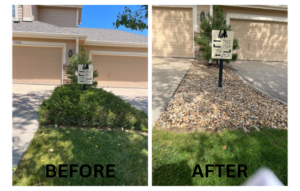
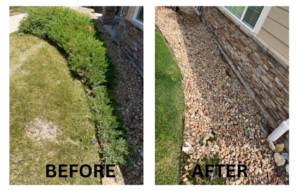
Forest Park HOA
This project removed ladder fuels throughout the open space, pruned large pines and removed ladder fuels from around them, thinned gambel oaks, and removed dead trees, willows, and accumulated deadfall.

HOA 2 Resident
Cleaning pine needles and pine cones, trimming trees, pruning shrubs, trimming trees off of the house, and removing a dead tree.
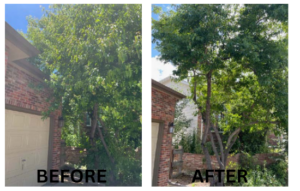
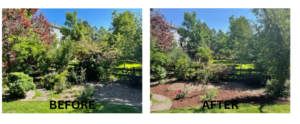
Forest Park Resident
Removal of overgrown bushes and dead scrub oak, cleaned scrub oak growth below two sets of oaks and removed ladder fuel oaks around one large pine.
